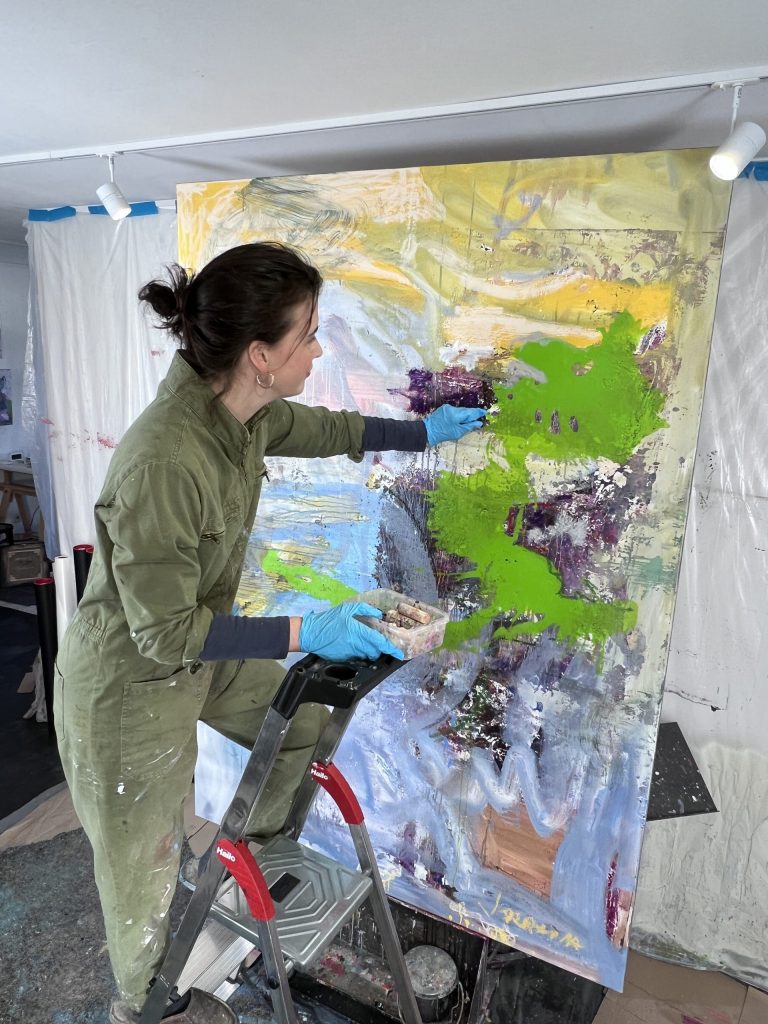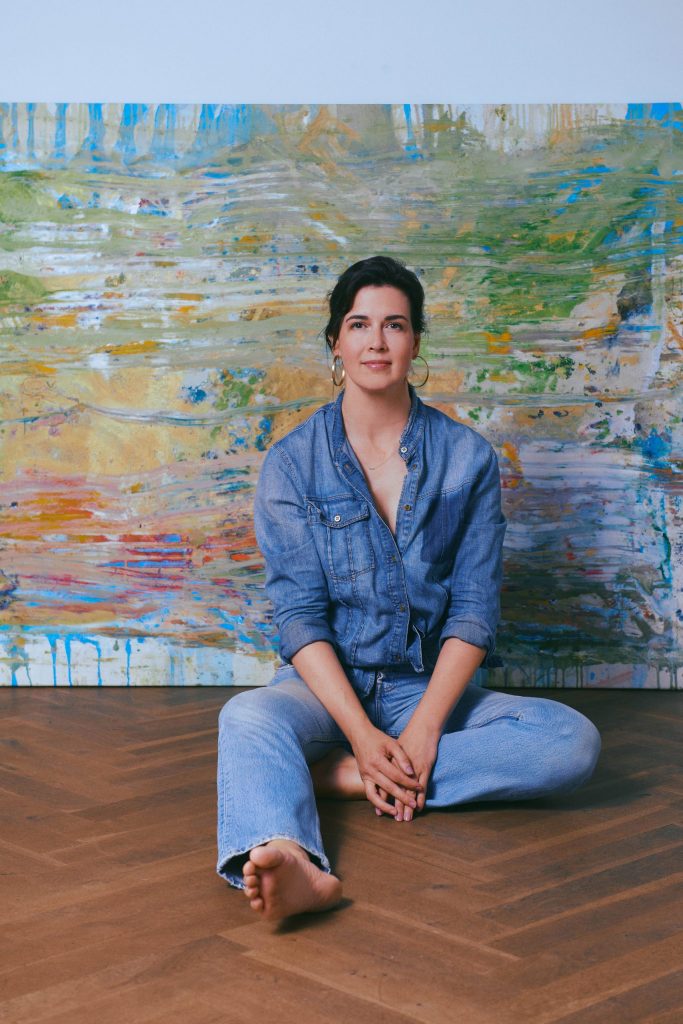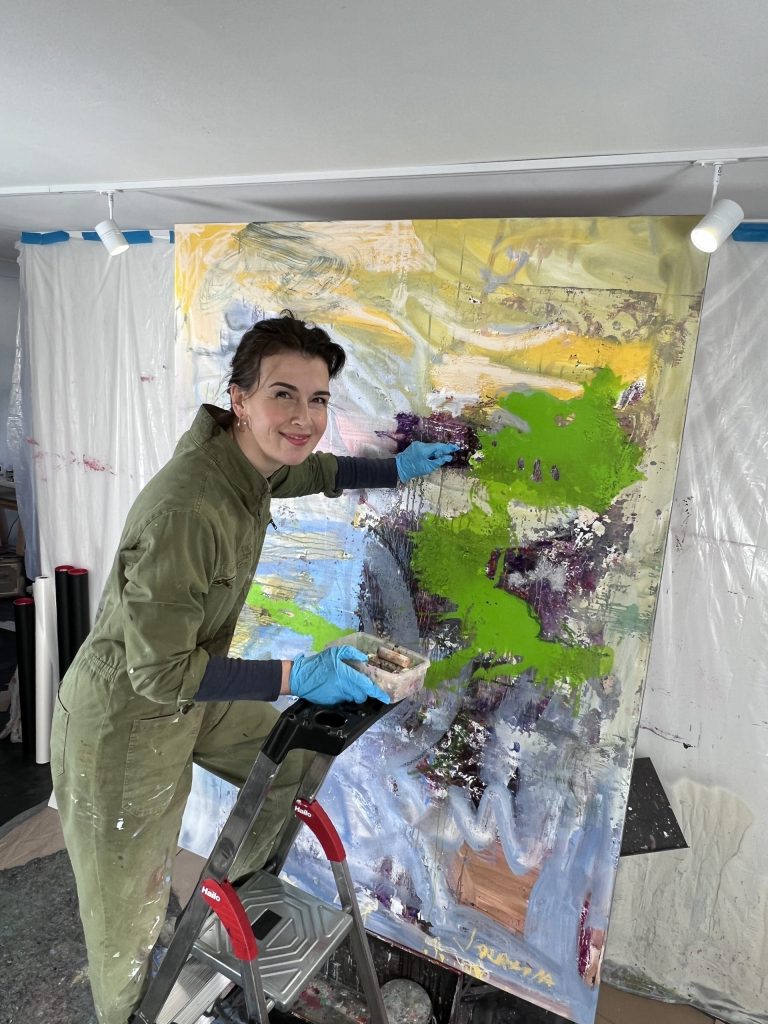Q: Introduce yourself — who you are and what your vision as an artist is?
A: Hello, my name is Jordana Rae Gassner. I am an American abstract expressionist artist living in Bavaria, Germany. My art mainly focuses on metaphysical realism and I work almost entirely in oil paints.
The first years of my life were spent in the Black Hills of South Dakota where I learned to cherish running barefoot through fields and rock climbing, enjoying the boundless nature to be found in what was once the Wild West. During my childhood, I learned to appreciate art to a certain extent, but it was always considered something that was nice to have, but not a necessity. Nevertheless, I was always spending time creating something, whether it was murals and paper mâché sculptures, or participating in the theatrical arts.
In my early 20s, I was introduced to acrylic paints which enabled my first foray into creating images on canvas with thick layers of paint, or impasto painting. For me, it was a very pivotal point in learning all paintings need not be aquarelle or children’s finger paints (although I’d enjoyed the consistency of the latter). During those same years, my studies brought me to the University of Bergen in Norway, as well as the Universidad de las Americas in Mexico City, Mexico and Concordia College in Moorhead, Minnesota where I studied Psychology, Philosophy, Literature, and Mythology.
Around 2005, whilst living in Seattle, I was taking weekend classes at the University of Washington on how to paint and “see” color, when I discovered and began to explore the unique qualities of oil paints. For example, finding out that oil paintings need around 100 years to completely oxidize as they do not dry as one would expect was absolutely fascinating to me, and I wanted to use this newfound information to create modern works and develop my own style. During my studies at Concordia College, I had come across a sentence in a book that I have sadly forgotten the title and author of… the gist of that sentence was that art is made to “Glorify God (or whatever higher power one would like to express as such), exemplify a mechanical technique, or to bring awareness to social injustices/plight”, and that the best art does all three. That notion has stuck with me for over 25 years and is the one guiding principle I use in creating a series. I ask myself which of those three I would like to use as a foundation and strive for ways to incorporate all of them.
I currently live and work in Regensburg, Germany, and spend much of my time wondering how to bring ideas of science and spirituality onto traditional supports such as linen canvas.
 Q: What is your background?
Q: What is your background?
A: Mostly, I identify as a small-town girl from the Midwest who grew up surrounded by the imagery and culture associated with Native Americans and cowboys. The thing is, as a child I was never taught to view either of them as being better than or less than the other. My German-immigrant great-grandfather traded with the Native Americans as easily as with the European settlers. It wasn’t until high school that I began to read about the atrocities people who lived so close to me had experienced. It breaks my heart still, just as my heart breaks learning of any of the horrors of this world, driving my wish for my artwork to bring a sense of hope and wonder to those looking.
Q: What is your work philosophy and how does that impact your work?
A: I grew up in a Protestant household which means one works hard, applies as much common sense as possible, and treats others with the Golden Rule. All of that meant a legitimate career in art was not really in the cards, or so I thought back then. Having managed to find teachers of all sorts as I traveled and lived in different places, I would sneak off to a quiet room to practice drawing, or my dear husband would watch the children while I went to yet another art class. These days, it is with much gratitude that I no longer need to sneak off or carve out time to create and can instead do as I have always wanted; to paint or draw every day of my life. Administrative tasks involved in running a business take up a lot of my week and I still do have a side job, but generally, my weeks bring me into the studio for at least 30 hours of painting, even if 10 of them happen in one go on a Sunday. For me, painting is not something I do, it is what I am, an artist painter, and that means I dedicate as much time as possible to honing my skills and keeping at the easel in continuing to make marks in anticipation of those moments of pure flow in creation.
 Q: What artist(s) inspire you?
Q: What artist(s) inspire you?
A: The artists I most refer back to while I am choosing the layout and mixing colors begin with John F. Carlson because even though I‘d never met him, his book on landscapes taught me how to see trees and understand the atmosphere. Helen Frankenthaler’s name comes to mind as she reminds me that one painting in about a dozen will ever be any good. Oh, and Mark Carder, whose Draw Mix Paint classes taught me to refine my color mixing, pay strong attention to value and asking questions such as „is this too blue?“ and be able to correct. Though really all artists who dedicate their lives to consistently making art, whether it be to make a living or merely be a creative outlet, are an inspiration to me.
Q: What is the best advice you’ve received?
A: “Keep moving.”
In other words, keep creating, keep showing work, keep meeting people, keep applying for shows, keep contacting galleries, keep asking for collaborations, keep taking time for rest, and re-connect with that which anchors you (for me, that barefoot strolls or swimming in icy lakes and rivers), but most of all keep loving what I’m doing, even and especially when it’s hard. I keep moving because being able to create art and develop that into a sustainable business by working with art fairs and galleries to meet with collectors and art enthusiasts is one very big gift that I will never take for granted.
 Q: When you are not working, where can we find you?
Q: When you are not working, where can we find you?
A: Aforementioned lakes, rivers, and the occasional park watching clouds and the wind whip around trees.
Q: What does exhibiting at Spectrum Miami 2022 mean to you?
A: So much honestly. Redwood Art Group has been very gracious in supporting artists to show our work to a wider public. I am really looking forward to meeting everyone at the exhibition and thankful for the real experience in seeing artwork in person instead of being limited to shows via the internet. It is very exciting. There is going to be a lot of opportunities to get to know new people and hopefully create some great projects going forward. I’d love to look into exhibiting at other Redwood Art Group exhibitions such as Dallas or maybe New York and this is a chance to confirm what I already feel to be a really good fit with my art.


